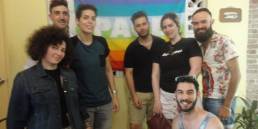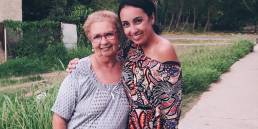We spoke with Cherie Cancio and Daniel Jiménez, two of CubaOne Foundation’s founders, to learn more about the foundation, the application process, and how fellows are chosen to travel with TuCuba.
Firstly, Why did you you start CubaOne Foundation?
D: Because it’s the right time. There’s so much healing and positive discussion that can happen right now because of this connecting that’s happening between our two countries.
I went to Cuba for the Havana marathon last year, and my conversation with my dad afterward allowed him to remember so much about his childhood and this painful thing he went through. I saw him process it and deal with it and heal it in a way I’d never seen happen before.
When you look at that happening across hundreds and thousands of people, it’s so exciting — the healing that is going to happen from this exchange. I wanted to create a space for it.
C: What triggered my intense interest was the idea of bringing together a group of people with completely different backgrounds, whose only connection is that their parents or grandparents came from Cuba — what would it be like to take them to the island, what possibilities would spring from it, and how rich would their conversations be?
D: It’s about bringing people together.
C: And connecting them to the people on the island. Connecting to people your own age in the US and in Cuba gives you such a different perspective than you might get from family members.
Why is it so important to go to Cuba?
D: Going to Cuba never felt like a possibility before. But, as grandchildren of exile, it has a place in our history and our hearts.
There’s a shift in generations happening right now — our grandparents, who made the courageous decision to leave Cuba, are getting older. If we want to have conversations about Cuba’s reality it has to happen now.
C: Over the years, the shifts in I’ve seen in Cuba have always come from people who weren’t Cubans on the island. In order for true reconciliation to take place, our generation needs to be a part of it.
Obama took away the curtain of taboo and mystery around Cuba, and now it’s open to people who’ve never traveled there before. People are talking openly about Cuba who wouldn’t have in the past. Things have changed and it’s time for our generation to use that, to allow the people who will be a part of the future to have those conversations.
D: It’s an opportunity for there to be a thoughtful discussion about what has happened in the past and where things are headed, and I don’t think just anyone can do that — it has to be Cubans.
C: We respect and understand what our parents went through but we are slowly shedding the anger, or we never had it in the first place.
D: We want our generation to create its own story. We want millennial Cuban Americans to develop their own narrative.
What is the application process?
D: We try to make it easy. There are three steps in the process.
1. The online, written application
We’ve had about 1300 applicants in our first three months.
Here we ask: Who are you, and why do you want to go?
We want to be able take anyone who wants to go and has strong Cuban heritage, but we’re not looking for people who just want a free trip. We’re looking for people who have really thought through why they want to go to Cuba. The why is really important, but also that an applicant is able to go — this is why we ask whether applicants have a passport.
2. The second round app, also written
About 200 applicants have advanced to this stage.
Here we ask a few more questions: How is your going going to affect you? How is your going going to affect the Cuban people? How is it going to lead to stronger relationships between our countries? How is it going to affect our communities here when you return?
These apps go out to reviewers outside the organization, who review them anonymously — the reviewers have no idea what anyone looks like, their gender, ethnicity, nothing like that. They score based on a rubric, so it’s very objective.
3. The Interview, via Skype
C: About 20 applicants make it through to this final stage for each trip.
This is where the applications turn back into real people, and it’s the most exciting and fun piece.
Here we select ten fellows to build a group we feel will bond and support each other. We’re building a team who’ll be going through a transformative experience together, and we want everyone to be comfortable. We look at diversity, inclusivity and group dynamic.
This part is so exciting because you’re taking people that might not ever have hung out, from all corners of the country, and by the end of the experience they will have developed this very rich and deep connection with one another. It is very rare that you have the opportunity to be a part of something like this.
By this stage any one of the 20 applicants would be excellent candidates for TuCuba, so it comes down to building a group who will work together, and which is diverse across racial background, age, homebase, life experience and expertise.
What basic criteria do you look for in applicants?
- The ability to travel internationally
- A strong intent that matches our mission at CubaOne
- The ability to work with the group
- The ability to have a large impact when they return
D: At this time we can only take a small number of people, so we need to know your going will have a large impact on a large number of people — whether through your work or your personal network, we need you to show servant leadership in some area.
C: We want to take people who are leaders in their field and community, and who are mission- and experience-driven, and have an orientation towards societal impact.
What else would you like applicants to know?
C: Read our mission. Get to know the organization and why we started this. Then: sell your story. This is not the time to be shy! Build your narrative, and let all your passion and everything you’ve got come through in your application.
D: I think you should go to Cuba. This is one way to do it, but it’s not the only way. This is the right time to go — so get there. Buy a plane ticket, ask your family to go with you — ¡Ve a Cuba!

Cherie Cancio
Cherie Cancio is a Founder of CubaOne and serves on its Board of Directors as our Program Leader. She's been recognized as a 'Miami Girl' and pursues social entrepreneurship across South Florida.


